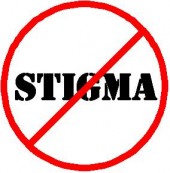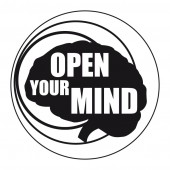Putting Mental Illness in Perspective
First diagnosed with mental illness, many of of us feel a little--a lot--angry and confused. We might wonder what we did wrong to deserve a diagnosis that carries stigma and no absolute cure.
Perhaps we feel we will never recover from mental illness, it will follow us through life, biting at our ankles like a dog we wouldn't mind kicking. And that's normal, that's human, there is not a person on this earth that---I will take the liberty to assume---does not have a hard time accepting the diagnosis. At first.
All this aside, putting your mental illness, the diagnosis of it, in perspective is important.
Stigma & Mental Illness
Mental Illness carries stigma.  You know this and I know this. It's a tough pill to swallow, you sort of choke on the diagnosis at first, that's normal. But as the months pass, as you recover, the feeling lessens. When you find stability you find a little peace. Later, as time passes, more.
You know this and I know this. It's a tough pill to swallow, you sort of choke on the diagnosis at first, that's normal. But as the months pass, as you recover, the feeling lessens. When you find stability you find a little peace. Later, as time passes, more.
That aside, I have learned in the decade and more since I was first diagnosed, that relishing in a feeling, a belief, that you are unique in your pain makes recover harder, the process much slower.
I have learned that putting our illness in perspective is crucial.
Putting Mental Illness in Perspective
Yes, that is the title of this blog, assuming it is important. It is. But you might be surprised about what I am going to talk about. I am going to detour from the obvious, the talk of stigma, recovery, medication, etc.
I want to talk about other people. People we don't know. People who suffer as well. Sometimes, amidst out own struggle, we can forget about people who struggle in different ways.
People we don't know. People who suffer as well. Sometimes, amidst out own struggle, we can forget about people who struggle in different ways.
I was walking my dog yesterday and a young woman ran up with her dog. She pet my mine and said he was cute. And then she said: "I have Autism." Yes, a strange thing to say to a stranger, but she suffers as well. We spent some time talking about normal things and then she walked away. A woman from my condominium, also walking her dog (yes, my area is a mecca of dog owners), walked up to me and said:
"Apparently she has Autism, but it's all in her head."
I replied: "Autism is a disease" and she nodded her head, probably sensing my frustration, my anger at her indifference and lack of empathy. That woman, despite her comment, well, she suffers too. Like most people, it's not something we talk about.
I could give many examples but lets stick with this one. It's a good one.
Living With a Mental Illness Involves Empathy
According to my Thesaurus--and empathy is a feeling more so than a definition--is defined by:
> [The ability to]Relate to people emotionally
> To Identify with others
>To be a 'person of heart'
I like the last one. To be a person of heart. Sometimes, we can be a little selfish in our suffering. But not intentionally. When we are diagnosed with a mental illness our first feeling is that of feeling alone, alienated, less than others. Stigmatized.
Throughout our struggle, those closest to us demonstrate empathy. A high level of it. They might not understand how we feel but they understand pain. And we should too.
Mental Illness and Empathy
It's healthy, crucial, that we can try to step out of our own head, our own periods of suffering, to remember that other people suffer, and our own experience with mental illness makes us, naturally, more empathetic to other peoples pain. Our pain is different yes, but pain is part of the human condition, it builds character. And understanding of people and of life.
Our pain is different yes, but pain is part of the human condition, it builds character. And understanding of people and of life.
That young woman I spoke to, she has her own pain and I could respect and relate to it. The people we don't think about because we don't see them, those battling physical illness, they suffer as well.
Putting your mental illness in perspective, reminding yourself that you are human and not as isolated as you feel, makes the world a different place: a place where we fit in, a place where we are not exclusively unlike others, no, we are, in many ways, the same.
APA Reference
Jeanne, N.
(2012, February 23). Putting Mental Illness in Perspective, HealthyPlace. Retrieved
on 2026, March 4 from https://www.healthyplace.com/blogs/recoveringfrommentalillness/2012/02/putting-mental-illness-in-perspective
Author: Natalie Jeanne Champagne
This is an excellent article about having empathy for others. However, it is important to note that Autism is not a disease or an illness. Disease and illness implies recovery. Autism is a disorder that has no recovery. Those who have autism may also have concurrent mental illnesses such as anxiety or depression, however not all. At an excellent resource such as HealthyPlace, accurate depictions of mental illnesses and disorders should be made clear so as to further create awareness and offer education.
Stigma and labeling of mental illnesses is profoundly impediment of a satisfying treatment and appropriate overcoming to psychiatric entities. Thus, it is ought to make effort in destigmatisation of these specific and tenderness humane diseases. Even there are many national and international projects and activities in this issue, the reality shows that yet exist many misunderstanding and misconception on mental disorders. By me as clinical psychiatrist, it should to change radically our outlook on mental health and its disorders as unavoidable burden of our daily global life functioning and performance. The same undrtakings shoul be in concordance with scientific accomplishment of brain secrets, that are of epochal dimension through last two decades. Eventually, new knowledge would be sterile if they shouldn't be implemented in real life.